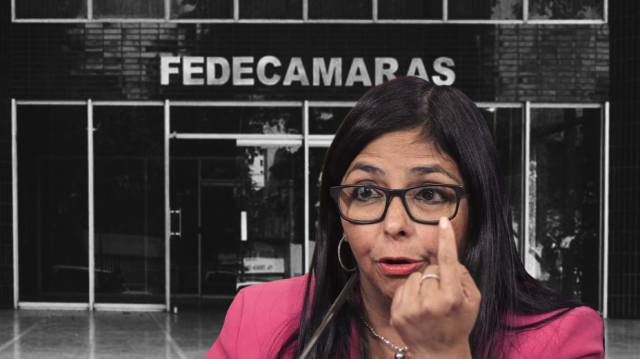
Putting aside years of harassment and humiliation, Venezuela’s most important business chamber brought in a key Maduro ally to its annual meeting. But this “whatever we can get” approach brings its own problems.
By Caracas Chronicles – Diego Bautista Urbaneja
Jul 28, 2021
This year’s Fedecámaras Annual Assembly noticeably had, as a guest of honor, no other than Maduro’s vice president, Delcy Rodriguez. We know that inviting the heads of government is a formality this institution has maintained, but the regime has been ignoring that invitation since before Chávez passed. However, this time the invitation was accepted thanks to efficient intermediaries between the government and the private sector. It’s not an irrelevant event and we need to think it through several levels.
It isn’t difficult to understand the reasons why people from the most important chamber of Venezuelan business associations may be interested in talking to the regime. There are many arguments about the need for agreements to face the economic crisis that affect us all, the defense of employment, or the rise of salaries. But things are not so simple.
Let’s start at the moral level. I take Fedecámaras as the representation of the Venezuelan business community –beyond the internal disagreements that may exist within it– and in such capacity, it issued an invitation that this time was expected to be attended. It was also expected that the starring role would be played by a representative of the circle of power that declared itself a sworn enemy of the system that business people symbolize: capitalism. I don’t know how much ideology remains in this regime, but this is an essentially anti-capitalist regime –and I’m talking only in terms of its relationship with the private sector; let’s not abound about the regime’s relationship with the rest of us, what it has meant to this country during these years. Nothing forces Fedecámaras to invite anyone, even less if the guest has dismissed the host for so long. In a moment when every gesture has a meaning, we saw Fedecámaras, inviting to the center stage, the regime responsible for the suffering described by the chamber’s new president in his speech. The hosts definitively must ask themselves the moral meaning of that invitation.
Let’s go now to another level. No matter what they say, the regime and the business people are class enemies. In fact, for the regime, the private sector is a structural enemy. Capitalists can smile at the regime all they want, but they always will be seen by chavismo as a perverse sector, despicable, an exploiter focused only on making money. The regime will never allow the business community to be a strong, autonomous actor. Maybe it could get a very limited space if its members are okay with being subordinate to the regime; more than that, however, no way. And chavismo, from its point of view, is right to try to keep the business community at bay because, beyond the applause we just heard, the business guild knows how much to expect from this regime and will always want its end.
Here we reach the sanctions issue. The greatest praise I’ve heard about the sanctions came from one businessman in favor of talking with the regime. He said – I’m quoting from memory – that sanctions won’t bring a political change, but an economic change. He meant that the regime will stay in power, but the sanctions will force it to change its economic policy. According to this, sanctions made the miracle of altering the economic behavior of the chavista government. But that is not happening, the miracle has not taken place. The regime doesn’t think it must change, and it won’t assume an economic orientation it doesn’t seriously believe in—granting a central role to a structural enemy that considers quite dangerous. As soon as it can, the regime will again do what it loves to do: accumulating power—to ambush its real or potential adversaries, to destroy the illusion of hypothetical agreements.
At this point, we can only hope that some people in our business community are not joining what was known as the “Nicaraguan model”: “let the regime be what it may be, as long as it allows us to do business—even with the regime itself.”
Apart from the questions about the negotiations or the political behavior that should be adopted, we cannot avoid the idea of what little is known about the nature of the regime and its internal cohesion. Regarding its nature, there are no definitive arguments to sustain what their vision actually is; and on the matter of internal cohesion, assessing it depends on reliable information, something almost impossible to obtain in Venezuela. Even with this lack of data, some things are quite clear: there’s no room for illusions here, we are facing the most inclement, implacable regime of Venezuela’s recent history.
…
Read More: Caracas Chronicles – Delcy Rodríguez at Fedecámaras: A regrettable episode
…

